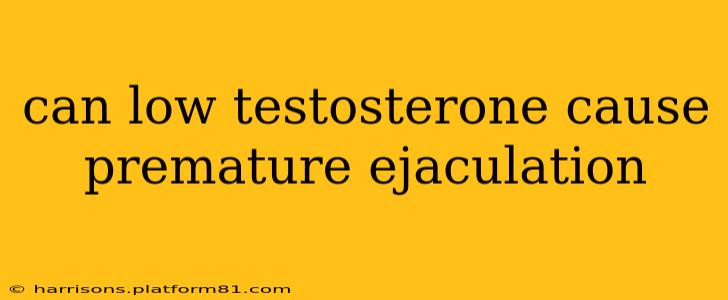Can Low Testosterone Cause Premature Ejaculation?
Low testosterone and premature ejaculation (PE) are both common issues affecting men, leading many to wonder if there's a connection. While not a direct cause-and-effect relationship, research suggests a correlation between low testosterone levels and experiencing PE. It's crucial to understand the nuances of this relationship, as low T can indirectly influence factors contributing to PE.
What is Premature Ejaculation?
Premature ejaculation is defined as consistent or recurrent ejaculation with minimal sexual stimulation before a man or his partner desires. This subjective experience can vary significantly between individuals, making diagnosis and treatment complex. The DSM-5, the standard diagnostic manual for mental disorders, outlines criteria for determining PE, emphasizing the impact on the individual and their partner's satisfaction.
What is Low Testosterone (Hypogonadism)?
Low testosterone, also known as hypogonadism, is a condition characterized by insufficient production of testosterone by the testicles. This hormonal deficiency can manifest in various symptoms, including reduced libido, erectile dysfunction, fatigue, decreased muscle mass, and mood changes.
How Might Low Testosterone Be Related to Premature Ejaculation?
The link between low testosterone and PE isn't direct. Low T doesn't cause PE in the same way a bacterial infection might cause pneumonia. Instead, the relationship is more indirect and multifaceted. Here's how low testosterone might contribute to PE:
-
Reduced Libido: Low testosterone often leads to decreased sexual desire. This reduced desire can create psychological pressure to ejaculate quickly, potentially exacerbating PE. The anxiety of wanting to "perform" quickly can trigger a quicker ejaculatory response.
-
Erectile Dysfunction (ED): Low testosterone frequently co-occurs with erectile dysfunction. If achieving or maintaining an erection is challenging, a man may experience increased anxiety about sexual performance, leading to premature ejaculation. The anxiety surrounding potential ED may further contribute to a shorter refractory period and premature climax.
-
Neurotransmitter Imbalances: Testosterone influences neurotransmitter systems involved in sexual response and ejaculatory control. Low levels of testosterone could potentially disrupt these delicate balances, indirectly increasing the likelihood of PE.
-
Psychological Factors: The diagnosis of low testosterone itself, and the associated physical and emotional symptoms, can create psychological stress and anxiety, which may worsen PE symptoms. The added stress of coping with low T levels on top of other anxieties may make premature ejaculation more frequent.
Does Treating Low Testosterone Cure Premature Ejaculation?
Treating low testosterone with testosterone replacement therapy (TRT) may improve some aspects of sexual function, including libido and erectile function. However, it doesn't directly address the underlying mechanisms of PE. While TRT might indirectly help some men with PE by improving their overall sexual experience and reducing performance anxiety, it is not a guaranteed cure for PE. Many men with low T and PE require a combined approach of addressing both conditions separately.
What are the Treatments for Premature Ejaculation?
Treatment for premature ejaculation typically involves a combination of approaches:
-
Behavioral techniques: These include techniques like the "squeeze technique" or "start-stop technique," which aim to improve ejaculatory control through learned desensitization.
-
Medication: Certain antidepressants (like SSRIs) and topical anesthetics can help delay ejaculation.
-
Therapy: Addressing psychological factors like performance anxiety can be crucial in managing PE. Cognitive behavioral therapy (CBT) is often recommended.
Can other health issues cause premature ejaculation?
Yes, several other factors can contribute to premature ejaculation, including:
- Neurological conditions: Certain neurological disorders can affect the nervous system controlling ejaculation.
- Thyroid problems: Both hyperthyroidism and hypothyroidism can impact sexual function.
- Diabetes: Diabetes can cause nerve damage (neuropathy) affecting sexual function.
- Prostate problems: Prostatitis or other prostate issues can sometimes contribute to PE.
It's important to consult a healthcare professional for diagnosis and treatment of both low testosterone and premature ejaculation. They can conduct proper assessments, rule out other underlying conditions, and develop a personalized treatment plan based on your specific needs and circumstances. Self-treating either condition can be dangerous and ineffective.
